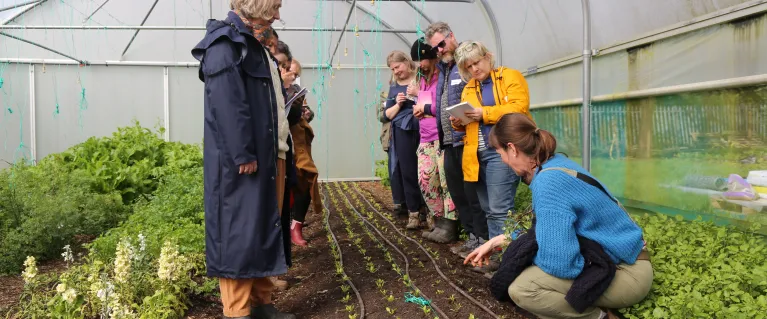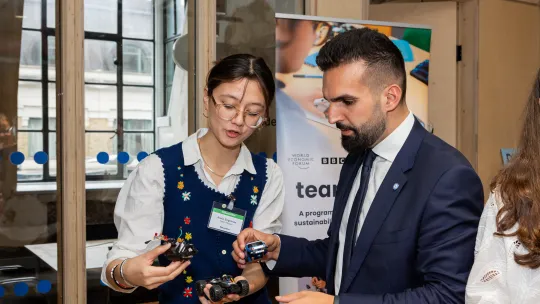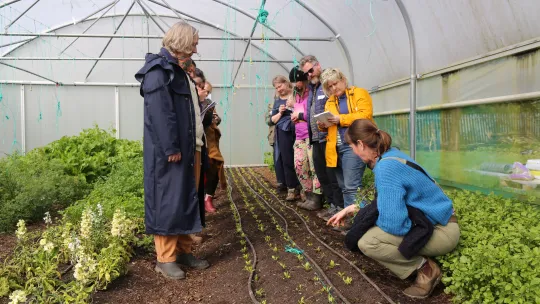
Case study: Circular Economy Support programme
Funding overview
Organisation name: ReLondon
Programme name: Circular Economy Business Support
Funding value: £1.4m
Programme objective: to help small businesses move towards a circular economy
UKSPF strand: Supporting Local Business
About the programme
Small and medium-sized businesses (SMEs) are crucial for the transition to a ‘zero waste’, low-carbon economy. Whether they are early-stage start-ups or long-established high street shops, they:
- represent 99 per cent of London businesses
- represent 61 per cent of UK employment
- generate 64 per cent of England’s commercial and industrial waste.
ReLondon’s UKSPF-funded activities are dedicated to unlocking the transformational potential of small business, and make them more resilient and productive, by shifting how physical materials– like food, packaging, textiles, and electricals – are bought, used and thrown away.
In action
The UK Shared Prosperity Fund has enabled ReLondon’s business transformation team to evolve the business support it began in 2017, helping small businesses navigate the opportunities of a circular economy – all the while emphasising resilience and commercial benefits, alongside environmental benefits.
The team have equipped small businesses with knowledge, funding, and contacts to help them implement and scale initiatives that shift how businesses use food, packaging, textiles, electricals and construction materials.
ReLondon’s approach has been to develop discrete, replicable support packages, each designed to help a specific beneficiary overcome a barrier to circularity.
Solving the challenge
The programme of work covers four areas:
- Growing London’s circular food system : unlocking growth with grants and mentorship for start-ups that transition London’s food system towards low-carbon, regenerative practices (December 2023 to June 2024).
- High Streets Beyond Waste: catalysing pilots with training, grants and mentorship for bricks-and-mortar businesses trialling zero-waste practices, helping develop a blueprint for high streets nationally (October 2023 to October 2024).
- Circular Business Community: strengthening the local ecosystem with advisory, promotional and matchmaking services for businesses bringing the circular economy to life (on-going).
- ReWear: unlocking growth with grants and mentorship support for start-ups that help extend the life of clothes in London (November 2024 to March 2025).
By March 2025, the funding will support 173 businesses across London, with 42 receiving grants to adopt or scale circular business models.
A success story: Growing London's Circular Food System
In December 2023, ReLondon awarded £134,500 to ten innovative circular start-ups in London. They were selected for their potential to create a regenerative, food system for London – such as converting food waste into kimchi or dyes, developing community-led food redistribution initiatives, and growing food in urban environments.
Together, they are responsible for 143 jobs, with 7 identified as at risk at the start of the project.
Reflecting ReLondon’s commitment to diversity, 80 per cent of grantees were led by women, 50 per cent by individuals from underrepresented groups, and 10 per cent by people with disabilities.
The start-ups have allocated the funds toward salaries and equipment, enabling them to streamline and scale their operations. Within six months, they have collectively diverted 13.1 tonnes of food waste, introduced four new products and services, and expanded their customer reach.
Other statistics include:
- 78 per cent reported improved operational efficiency
- 67 per cent noted enhanced environmental impact due to this support
- nearly 50 per cent succeeded in creating or safeguarding jobs with key sustainability skills.
ReLondon’s programme exemplifies how targeted support can accelerate the growth of London’s circular economy, driving both environmental and economic value and setting a model for similar initiatives across the UK.
Impact on Londoners
The impact of the programme is wide reaching for Londoners and London's businesses. Benefits include:
- Improving the choice and accessibility of circular products and services can help reduce the cost of living – for example, by saving money on groceries and household items or generating income from garments in the wardrobe. ReLondon found that Londoners spend an average of £460 per year to replace items that could have been repaired.
- Business models that rely on behaviours like renting, sharing and swapping can help with community cohesion, place-making and wellbeing, bringing citizens and neighbours together in new interactions. For example, the Library of Things have drawn 25,200 extra visitors to community spaces in 2022-23 through their rental model.
- Small businesses adopting or scaling circular practices can create quality job opportunities for Londoners, with wages in core circular jobs on average 183 per cent above the London Living Wage.
- Increasing the variety of circular choices across the city can help Londoners feel empowered, taking action on issues close to their heart - in a 2023 poll, 84 per cent of Londoners were concerned about climate change, with 15-35 per cent of Londoners already consuming in ‘zero waste’ ways such as repairing clothes, or buying second-hand or refurbished items.
Need a document on this page in an accessible format?
If you use assistive technology (such as a screen reader) and need a version of a PDF or other document on this page in a more accessible format, please get in touch via our online form and tell us which format you need.
It will also help us if you tell us which assistive technology you use. We’ll consider your request and get back to you in 5 working days.

